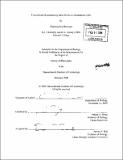| dc.contributor.advisor | Phillip A. Sharp. | en_US |
| dc.contributor.author | Petersen, Christian Paul | en_US |
| dc.contributor.other | Massachusetts Institute of Technology. Dept. of Biology. | en_US |
| dc.date.accessioned | 2008-02-28T16:21:31Z | |
| dc.date.available | 2008-02-28T16:21:31Z | |
| dc.date.copyright | 2006 | en_US |
| dc.date.issued | 2006 | en_US |
| dc.identifier.uri | http://dspace.mit.edu/handle/1721.1/34190 | en_US |
| dc.identifier.uri | http://hdl.handle.net/1721.1/34190 | |
| dc.description | Thesis (Ph. D.)--Massachusetts Institute of Technology, Dept. of Biology, 2006. | en_US |
| dc.description | Vita. | en_US |
| dc.description | Includes bibliographical references. | en_US |
| dc.description.abstract | The large complexity of animals is thought to depend upon the regulation of gene expression and not the number of genes in a genome. Gene expression is a highly conserved process in which genes encoded by DNA are transcribed in the nucleus into messenger RNA, spliced, and exported to the cytoplasm, where they are translated into proteins. It was therefore a profound surprise when RNA itself, in the form of [approx.]21nt short RNAs, was discovered to have major generalized roles in the regulation of mRNAs which are typically 100 times larger in size. These short RNAs, siRNAs and microRNAs, exert their influence on gene expression in mammals by RNA interference (RNAi) and translational repression. RNAi initiated by exogenous siRNAs results in mRNA degradation whereas many endogenous microRNAs cause translational repression. Some factors which produce siRNAs from double-stranded RNA or microRNAs from hairpin precursors are shared and some are unique to each pathway. Our work shows the interaction between short RNA and target mRNA, not the origin of the short RNA, dictates the outcome of silencing. Perfectly or nearly perfectly complementary basepairing between short RNA and target mRNA causes RNAi-mediated degradation of the mRNA, whereas partial basepairing results in translational repression and a degree of mRNA degradation. | en_US |
| dc.description.abstract | (cont.) This repression depends upon the number of binding sites within a target mRNA, and there is a synergistic relationship between binding site number and the degree of silencing. Further investigation of the mechanism revealed a post-initiation block to translation by short RNAs. Translationally repressed mRNAs associate with polyribosomes, and IRES-initiated translation, which bypasses normal initiation, can be repressed by short RNA. Polyribosomes associated with repressed mRNA are sensitive to treatment with the puromycin, demonstrating that these ribosomes can complete the elongation cycle. Pulse-labeling shows that short RNAs likely act before production of complete protein. Short RNAs cause an increase of translational termination at a stop codon. After a brief inhibition of translation initiation in vivo, ribosomes dissociate more rapidly from repressed mRNAs than from active mRNAs. These results show that short RNAs repress translation after initiation by a novel mechanism which causes ribosome drop-off. | en_US |
| dc.description.statementofresponsibility | by Christian Paul Petersen. | en_US |
| dc.format.extent | 115 leaves | en_US |
| dc.language.iso | eng | en_US |
| dc.publisher | Massachusetts Institute of Technology | en_US |
| dc.rights | M.I.T. theses are protected by copyright. They may be viewed from this source for any purpose, but reproduction or distribution in any format is prohibited without written permission. See provided URL for inquiries about permission. | en_US |
| dc.rights.uri | http://dspace.mit.edu/handle/1721.1/34190 | en_US |
| dc.rights.uri | http://dspace.mit.edu/handle/1721.1/7582 | |
| dc.subject | Biology. | en_US |
| dc.title | Translational regulation by short RNAs in mammalian cells | en_US |
| dc.title.alternative | Translational regulation by short ribonucleic acids in mammalian cells | en_US |
| dc.type | Thesis | en_US |
| dc.description.degree | Ph.D. | en_US |
| dc.contributor.department | Massachusetts Institute of Technology. Department of Biology | |
| dc.identifier.oclc | 69651435 | en_US |
